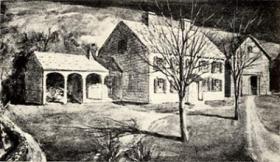
Major John Arms, leading early citizen and proprietor of Brattleboro’s notable gathering place known as the Arms Tavern (at the present Retreat farm) died from the kick of a horse on March 6, 1770. This is the very same day, 12 years before in 1758, that Captain Fairbank Moor and his son Benjamin were killed in an attack by Abenaki warriors at their cabin just a few hundred feet away (Brattleboro’s first settler outside of Fort Dummer). John Arms came from a family of frontierspeople and Indian fighters. Coincidence?



horse kick
The determination will be decided by a study of all 257 days since then noted by calendars as March 6th. But let me remind you of this. It is said that on the morning of March 6. 1876 Sitting Bull looked out at dark clouds gathering from the south and said to his famous colleague and partner in mischief, Crazy Horse, “I think we should call a meet with all the chiefs of Plains Indians. This guy Custer is giving me the creeps.” So, is March 6th a fateful day? You betcha. Do you think it is just a coincidence that the Ides of March begin on March 6th eve?
Battle as Old as the Hills
You’re playing fast and loose with the Ides, I’d say. Like people who celebrate their birthday a week before and after the actual date.
If we’re stretching ides, or ideas, consider this…. Wounded Knee Massacre occurred on December 29, 1890. That’s 120 years after Arms and Moor received their comeuppance from the universe. Those murders in Brattleboro were separated by a time interval of twelve years. One tenth the time. Was it not Julius Caesar, famously whacked on those Ides who instituted the Julian calendar, giving us 12 months, and the March 6 date in the first place? And aren’t Roman Numerals sequenced I, II, III, IV, V, VI, VII, VIII, IX, X…then the pattern repeats?
All too Spooky
I’m not leaving the house.
Both feet on the ground
I had to smile when I read this post but with a shake of my head. There isn’t a single connecting thread between the two events. So far removed are the two events that the question of coincidence should never even come up. And Karma? No cause and effect there I can see, unless you are Hindu or Buddhist.
Synchronicity?
I like to think of things like that as being strange coincidences, which some would call meaningful coincidences. Carl Jung called them synchronicities. I’m part Irish and I definitely believe in meaningful coincidences. Omens, warnings, signs…. Or just — hey look, these things are connected if not physically then on some other level.
With regard to Arms, I don’t know how common it was to die of a kick in the head from a horse, but Mr. Arms was a colorful character and his tavern played a huge role in the early history of Brattleboro. It was a post on the stage coach, a post office, a place for weary travelers to get a bite and a drink, and I believe the Green Mountain Boys used to drop by as well.
Too bad about Fairbanks Moore. He was both the first full-time English settler in Brattleboro and the last Brattleboro resident to be attacked by Indians. His wife was abducted but ransomed back a few years later.
And the cool thing is that it all happened right down the street. You can go look through Grafton Cheese to the spot where the first house and then the first tavern was built.
Anthropomorphic lens
Jung believed in a “divine drama” and wrote criticisms of god, therefore the man was essentially a believer. In fact, during the period of his recorded “fantasies” he describes the period as his “numinous beginning.” This firmly places him as a one who believes in the presence of a divinity.
Because of his elemental spiritualism in his analysis and personal experiences his views are the more popular in belief-dependent populations, as distinct from Freud’s skepticism of religion and spiritualism.
Jung also believed that the unconscious has memories that are inherited from ancestors, yet, I’ve not read any DNA scientific literature that supports that.
Jung also dealt with a collective unconsciousness where he saw the collective unconsciousness of human as being universal or something as a whole (collective) mind of humanity.
More modern views of consciousness, however, include most or all mammalian populations, who are of course, our conscious and sentient brother and sister animals. Little is studied of their consciousness or unconsciousness because Jung, like many people today, see the world around them through anthropomorphic (people centered) lens.
I find much of Jung’s views to be belief-induced conjecture that cannot be proved by any scientific method.